
Little Farmers
Giddy-up! We are bringing the farm to your classroom. Join us on a quest to find our farm pals, all while diving deep into the life-cycle of food. Children will connect with where their food comes from and learn how food grows.
At a glance
Duration: 45 minutes
Suitability: Up to 25 children
Age: 3-6 year olds
Using story-telling and interactive activities, this program takes children on a journey to connect them with where their food is coming from and how food grows. Learning about fruits and vegetables helps encourage healthy eating in children.
Your service will receive a certificate of participation. Each child also receives a certificate.
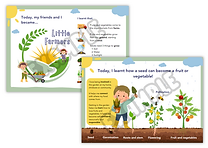.png)
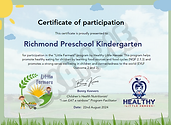
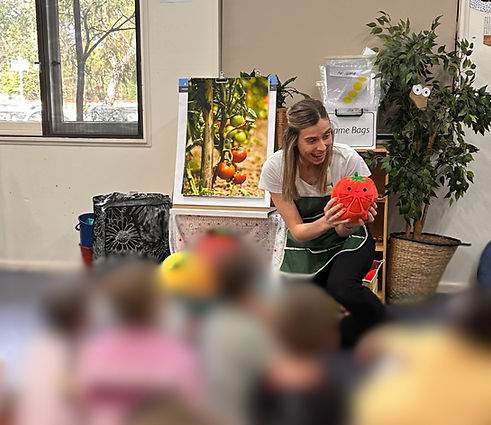
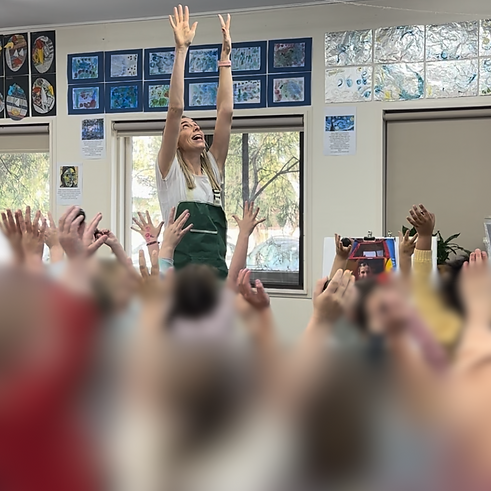
Why does this program work?
Where does my food come from?
It is important children connect with their food and where it comes from. It is known that when children learn about where their food comes from and engage in activities in the garden they:
-
are more likely to eat fruits and vegetables (NQF e 2.1.3)
-
begin to take more responsibility for their own health and wellbeing (EYLF Outcome 3)
-
become more self-confident and resourceful (EYLF Outcome 4)
The Little Farmers program is the perfect way to extend upon your herb/vegetable garden experiences at your service.
Involving children in gardening experiences at your service, at their home and community is important. Children should also learn about how their food is grown on farms and delivered to supermarkets before reaching their plates.
What can I expect?
-
Lots of laughs and excitement!
-
Children join the adventure with Farmer Bon, who is looking for her lost farm friends
-
The adventure starts at the supermarket, where fresh fruit and vegetable can be found. When Farmer Bon can't see her friends there, she has to find where else to look. Where does food come from before it reaches the supermarket?
-
Children join Farmer Bon at the farm, and learn all about what seed need to grow. They then dive into how fruits grow, and vegetables too
-
Will they find the cheeky farm friends hiding in the fields?
-
Children take a look at some great visuals of how food grows on a farm and it's journey to the supermarket, and then the children's plates!
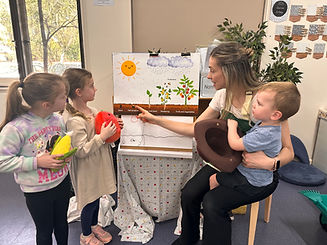
Learning Outcomes
Each child who attends a Healthy Little Heroes incursion will work towards achieving the following:
-
Developing a strong sense of wellbeing
-
Becoming confident and involved learners
-
Becoming effective communicators
-
Cooperating and working collaboratively with others
-
Being open to new challenges and discoveries
-
Showing an increasing awareness of healthy lifestyles and good nutrition
-
Being curious and enthusiastic participants in their learning
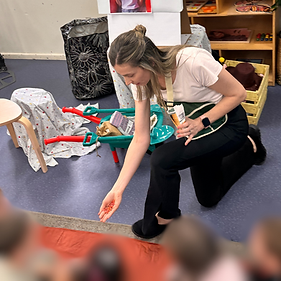
How the program helps
implement the NQF
This program directly relates to Standard 2.1
Health - Each child’s health and physical activity is supported and promoted.
Element 2.1.3 states ‘Healthy eating and physical activity are promoted and appropriate for each child’
Element 3.2.3 states ‘The service cares for the environment and supports children to become environmentally responsible’
Welcome visitors to your site with a short, engaging introduction.
Double click to edit and add your own text.
How the program helps implement the EYLF
EYLF Outcome 1: Children have a strong sense of identity. Children will become more aware of healthy food choices and will experience pride, confidence and self-awareness.
EYLF Outcome 2: Children are connected with and contribute to their world. This program helps children to become socially responsible and show respect for the environment by discussing the ways that the life and health of living things are interconnected.
EYLF Outcome 3: Children have a strong sense of wellbeing. This program promotes children’s ability to take increasing responsibility for their own health and wellbeing by engaging them in experiences and conversations that explore food sources and food cycles.